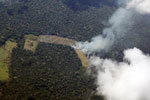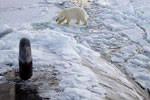An updated temperature analysis by the Met Office and the University of East Anglia’s Climatic Research Unit has confirmed that 2010, not 1998, was the warmest year since record keeping began in the late 19th Century. The new analysis adds in temperature data from 400 stations across northern Canada, Russia, and the Arctic, which is warmer the fastest but had been left out of the previous analysis.
“The new study brings together our latest and most comprehensive databases of land and marine temperature observations, along with recent advances in our understanding of how measurements were made at sea. These have been combined to give us a clearer picture of what the historical data can tell us about global climate change over the past 161 years,” Colin Morice, climatologist at the Met Office, said in a press release.
The new analysis pushes 1998 to third place, behind 2010 (first) and 2005 (second), and tracks closer to other temperature datasets from NASA and NOAA, which found that 2010 and 2005 were tied for warmest years.
The updated analysis undercuts denialists of climate change who have long-argued that global warming has “stopped” and the world was growing cooler. This argument, however, was always unscientific as the proof of climate change does not hinge on single record years, but overall trends that clearly show the world is warming rapidly.
Global temperatures have risen about 0.8 degrees Celsius (1.44 degrees Fahrenheit) since the Industrial Revolution. The past decade (2000-2009) was the warmest on record, and there hasn’t been a single year below the 20th Century average since 1975.
Related articles
Climate change could increase fires, logging, and hunting in rainforests

(03/13/2012) The combined impacts of deforestation and climate change will bring a host of new troubles for the world’s tropical rainforests argues a new study in Trends in Ecology and Evolution. Drying rainforests due to climate change could lead to previously inaccessible forests falling to loggers, burning in unprecedented fires, or being overexploited by hunters.
Tornado season likely to expand due to climate change
(03/06/2012) Last Friday, around a hundred tornadoes left a wake of destruction in the U.S., killing 39 people to date and destroying entire towns. The tragedy hit hardest in Kentucky and Indiana and experts predict the weather-disaster will cost over $1 billion. But isn’t this early for tornado season? Yes, say experts, and climatologists add that while research on tornadoes and climate change is currently in its infancy, it’s possible, probably even likely, that climate change is expanding tornado season in the U.S. due to the earlier arrival of spring.
Arctic warms to highest level yet as researchers fear tipping points

(02/13/2012) Last year the Arctic, which is warming faster than anywhere else on Earth due to global climate change, experienced its warmest twelve months yet. According to recent data by NASA, average Arctic temperatures in 2011 were 2.28 degrees Celsius (4.1 degrees Fahrenheit) above those recorded from 1951-1980. As the Arctic warms, imperiling its biodiversity and indigenous people, researchers are increasingly concerned that the region will hit climatic tipping points that could severely impact the rest of the world. A recent commentary in Nature Climate Change highlighted a number of tipping points that keep scientists awake at night.
Wall Street Journal climate op-ed: the “equivalent of dentists practicing cardiology”
(02/06/2012) Climate scientists have struck back at the Wall Street Journal after it published an op-ed authored by 16 mostly non-climatologists arguing that global warming was not an urgent concern. The response letter, entitled Check With Climate Scientists for Views on Climate, responds that the Wall Street Journal should seek input on global warming from climate scientists. Six of the 16 authors who published the original article have ties to Exxon Mobil and their professions range from engineers to astronauts. In turn the letter to Wall Street Journal was signed by 38 well-noted climatologists.
Acid oceans: in some regions acidification a ‘hundred times greater’ than natural variation
(01/24/2012) Emissions of carbon over the last two centuries have raised the acidity of the oceans to the highest levels in 21,000 years and likely beyond, according to a new study in Nature Climate Change. The change threatens a number of marine species, including coral reefs and molluscs.